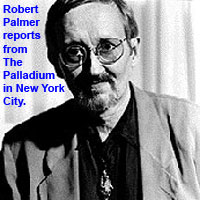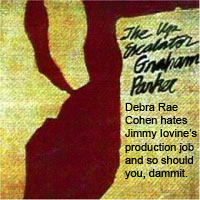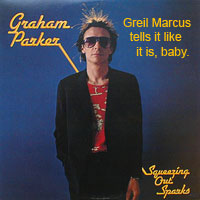
TITLE: Squeezing Out Sparks by Graham Parker and the Rumour
AUTHOR: Greil Marcus
SOURCE: Rolling Stone
DATE: 17 May 1979
Graham Parker's first 2 albums remain among the very finest of the decade: lyrical, intense, emotionally specific; a rough and untrained voice somehow merging perfectly with the Anglicized Blonde on Blonde/Stax-Volt classicism of the band. It was a signal debut, Howlin' Wind and Heat Treatment both arriving in 1976 along with a string of Let's-Conquer-the-USA club dates. Then Parker and the Rumour ahd to deal with commercial success, or rather the lack of it: to find themselves an audience or else face a foreclosed future of second-on-the-bill, short-term contracts and premature breakup, their best music perhaps ahead of them and out of reach.
Things did not work out. English punk--which Parker had anticipated with his working-class fury, if not his style--appeared, and made him seem irrelevant, or, worse, tame. Elvis Costello (who, when I first heard him, sounded to me like a hoax that Parker and his sometime producer Nick Lowe had thought up in an inspired moment) emerged with music and an image that could at once take off from punk and escape its enemies. More obsessed, savvy and marketable than Parker, Costello absorbed the few fans Parker had won, and leaped right over him. And on its own terms, Parker's career stopped cold. Stick to Me, out in late 1977, featured a narrow, grating sound that made it impossible to listen to; determined to get out of the US contract with Mercury, Parker followed with a bad live LP. The strategy worked, but whether Parker would be able to pull himself out of the hole he'd felt forced to dig was another question.
Squeezing Out Sparks, produced by former Phil Spector arranger Jack "Lonely Surfer" Nitzsche, lets you hear what Parker was after on Stick to Me, for it's made in the same vein, though this time the music is full of presence: turn the record up and it gets more exciting, not more shrill. In 1977, Graham Parker and the Rumour were reaching for the harshest edge in their music, and that's what they offer here. They've put aside the grandeur and the richness--horns, keyboards and the romantic pessimism--of the first 2 albums in favor of fuzz tone, fast tempos, hard drumming and desperate, even paranoid singing. The proof of the band's depth is that this approach is most successful at its most extreme.
Nobody Hurts You (harder than yourself, says the chorus) hits first, and does not wear out. The authority in Parker's voice--the way he commands your attention--and the momentum in Brinsley Schwarz's guitar playing can take your breath away. You can't tell if the song was written around Schwarz's riff--a searing, muscular attack that carries Parker past himself again and again--or if Schwarz pulled the riff out of something Parker showed him, be it melody or Parker's attack, but that riff is so strong and distinctive the band finally steps back and simply lets Schwarz take the song. Parker mutters in the corners as the track turns into an affirmation of emotion itself. As with so many of Parker's best tunes, the lyric is about refusal: refusal to be pinned down, trapped, ambushed, humiliated, obscured. Parker just strings together situations he must get out of, and when he at last puts his finger on the truth and the whole band crashes down on: "Look! No one's going to illuminate you. All the odds are stacked against you"--you believe every line, your back against the wall.
This performance needs no time to grow on a listener; others may. Passion Is No Ordinary Word, Local Girls, Protection, and Don't Get Excited are all good tracks (Saturday Nite Is Dead and Waiting for the UFOs are not good at all), but most betray a kind of rhythmic uncertainty, a doubt about where to take the tune that's too often covered over by mannered cries from Parker that fail to grab hold. You Can't Be Too Strong is a tougher problem. As with the other cuts mentioned, it means to define the vision Parker is offering, a vision that might be more compelling on Squeezing Out Sparks than on earlier records: the belief that, as F. Scott Fitzgerald put it, "life is essentially a cheat"; that penetrating to the source of one's emotions is necessary to a decent life but not a guarantee of it (nothing is); that struggle, not happiness, is what life is all about. But Parker has never tried to apply that vision to a subject as difficult as that in question here.
You Can't Be Too Strong is about an abortion. Sung with force and accompanied acoustically, it's a (perhaps too obviously) stark, personal statement. Well, when it comes to right-to-life rock, I prefer the "FUCKING BLOODY MESS!" of the Sex Pistols' Bodies. Graham Parker's response to the same sexual and political fact is to sentimentalize his one-man-against-the-world stance, almost to prettify it. The thing is, see, this girl he got pregnant just wasn't strong enough to have the baby; the doctor wasn't strong enough to refuse to perform the operation. And so, out of weakness, they surrender to murder, or anyway a cheapening of life--and cheapening of life is indeed what Parker fights against. But the received, moralistic qualities of the performance--Parker's choice of folkish tone and music no less than his words--call the strength of his vision into question. The woman in the song is less the bearer of a child than the bearer of an issue; she's merely weak, not someone given enough life to be a real challenge to Parker's vision, and thus give it life. And that's cheap.
But Parker's vision is worth questioning; that of most performers is not. Discovering Japan, the first cut on Squeezing Out Sparks and the number that best speaks for the album, rams home Parker's music-as-way-of-life, by reducing it to a demand for meaning, for the fleeting revelations through which one makes sense of the world. This is a lyrically confusing and musically undeniable account of flight, of an adventure that seems more like an escape. It's as explosive a piece of rock & roll as we are likely to hear this year.
Parker takes off on a jet for the land of cherry blossoms and Hiroshima, and when he confronts the time change--"My watch says 8:02 but that's midnight to you"--he somehow makes that tiny fact seem as threatening and dangerous as the sudden memory of a murder he committed in his sleep. Images of American occupation and Tokyo street life clash and seem to go nowhere. You have only the pace of the song to carry you along, but with guitar from Schwarz on the order of the budda-budda-buddas that used to punctuate Sgt. Fury comic books, you don't stop to think. The sense of final adversity, of the need for emotional release and for some kind of clarity, hits with more power than anywhere else on the record. This song is struggle. When Parker leaps out of the chaos he's created, with a glimmer of displaced, fragmented insight: "But lovers turn to posers. Show up in film exposures. Just like in travel brochures. Discovering Japan!"--you may not be able to figure out why those words end the song so perfectly, why they suddenly make emotional, not rational sense out of the fantasized quest the track now seems to have been all along, but you will be caught up in Parker's refusal of whatever it is life has in store for him.
Squeezing Out Sparks is no landmark. If you're looking for an LP with the coherence and weight of Bruce Springsteen's Darkness on the Edge of Town, you may be disappointed. The album, rather, is one chapter in the story Graham Parker and the Rumour are telling--a tale sometimes subverted by weaknesses of nerve, imagination or craft, a tale of true fear and drama. It's often been said that the work of those artists we most care about becomes part of our own autobiographies. Such work allows us to understand our own successes and failures. This has been true of the music of Bob Dylan, Neil Young, Jimi Hendrix, Rod Stewart, Sly Stone, Janis Joplin--all people who have, at considerable risk, exposed themselves and allowed others to understand how little they were holding back, and thus allowed others to respond in kind. Whatever the flaws of Squeezing Out Sparks, this remains true of Graham Parker.







